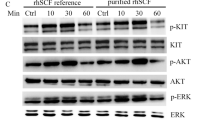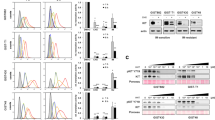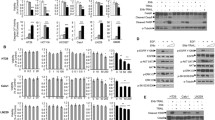Abstract
Autocrine activation of c-kit (KIT receptor tyrosine kinase) has been postulated to be a potent oncogenic driver in small cell lung cancer, neuroblastoma (NB), and poorly differentiated colorectal carcinoma (CRC). Although targeted therapy involving tyrosine kinase inhibitors (TKIs) such as imatinib mesylate is highly effective for gastrointestinal stromal tumor carrying V560G c-kit mutation, it does not show much potential for targeting wild-type KIT (WT-KIT). Our study demonstrates the role of stem cell factor (SCF)-based toxin conjugates for targeting WT-KIT-overexpressing malignancies such as NBs and CRCs. We constructed SCF-based recombinant bacterial toxins by genetically fusing mutated form of natural ligand SCF to receptor binding deficient forms of Diphtheria toxin (DT) or Pseudomonas exotoxin A (ETA') and evaluated their efficacy in vitro. Efficient targeting was achieved in all receptor-positive neuroblastoma (IMR-32 and SHSY5Y) and colon cancer cell lines (COLO 320DM, HCT 116, and DLD-1) but not in receptor-negative breast carcinoma cell line (MCF-7) thereby proving specificity. While dose- and time-dependent cytotoxicity was observed in both neuroblastoma cell lines, COLO 320DM and HCT 116 cells, only an anti-proliferative effect was observed in DLD-1 cells. We prove that these novel targeting agents have promising potential as KIT receptor tyrosine kinase targeting system.







Similar content being viewed by others
References
Antignani A, FitzGerald D (2013) Immunotoxins: the role of the toxin. Toxins 5:1486–1502. doi:10.3390/toxins5081486
Ashman LK (1999) The biology of stem cell factor and its receptor C-kit. Int J Biochem Cell Biol 31:1037–1051. doi:10.1016/S1357-2725(99)00076-X
Attoub S, Rivat C, Rodrigues S, Van Bocxlaer S, Bedin M, Bruyneel E, Louvet C, Kornprobst M, André T, Mareel M (2002) The c-kit tyrosine kinase inhibitor STI571 for colorectal cancer therapy. Cancer Res 62:4879–4883
Barth S, Huhn M, Matthey B, Klimka A, Galinski EA, Engert A (2000) Compatible-solute-supported periplasmic expression of functional recombinant proteins under stress conditions. Appl Environ Microbiol 66:1572–1579. doi:10.1128/AEM.66.4.1572-1579.2000
Bellone G, Carbone A, Sibona N, Bosco O, Tibaudi D, Smirne C, Martone T, Gramigni C, Camandona M, Emanuelli G (2001) Aberrant activation of c-kit protects colon carcinoma cells against apoptosis and enhances their invasive potential. Cancer Res 61:2200–2206
Bellone G, Silvestri S, Artusio E, Tibaudi D, Turletti A, Geuna M, Giachino C, Valente G, Emanuelli G, Rodeck U (1997) Growth stimulation of colorectal carcinoma cells via the c-kit receptor is inhibited by TGF-1. J Cell Physiol 172:1–11. doi:10.1002/(SICI)1097-4652(199707)172:1<1::AID-JCP1>3.0.CO;2-S
Bellone G, Smirne C, Carbone A, Buffolino A, Scirelli T, Prati A, Solerio D, Pirisi M, Valente G, Nano M, Emanuelli G (2006) KIT/stem cell factor expression in premalignant and malignant lesions of the colon mucosa in relationship to disease progression and outcomes. Int J Oncol 29:851–859. doi:10.3892/ijo.29.4.851
Beppu K, Jaboine J, Merchant MS, Mackall CL, Thiele CJ (2004) Effect of imatinib mesylate on neuroblastoma tumorigenesis and vascular endothelial growth factor expression. J Natl Cancer Inst 96:46–55
Bialas M, Borczynska A, Rozwadowska N, Fiszer D, Kosicki W, Jedrzejczak P, Kurpisz M (2010) SCF and c-kit expression profiles in male individuals with normal and impaired spermatogenesis. Andrologia 42:83–91. doi:10.1111/j.1439-0272.2009.00960.x
Bishi DK, Mathapati S, Cherian KM, Guhathakurta S, Verma RS (2014) In vitro hepatic trans-differentiation of human mesenchymal stem cells using sera from congestive/ischemic liver during cardiac failure. PLoS ONE 9:e92397. doi:10.1371/journal.pone.0092397
Botchkina G (2013) Colon cancer stem cells—from basic to clinical application. Cancer Lett 338:127–140. doi:10.1016/j.canlet.2012.04.006
Bruell D, Stöcker M, Huhn M, Redding N, Kupper M, Schumacher P, Paetz A, Bruns CJ, Haisma HJ, Fischer R (2003) The recombinant anti-EGF receptor immunotoxin 425 (scFv)-ETA'suppresses growth of a highly metastatic pancreatic carcinoma cell line. Int J Oncol 23:1179–1186. doi:10.3892/ijo.23.4.1179
Burnette WN (1981) "Western blotting": electrophoretic transfer of proteins from sodium dodecyl sulfate-polyacrylamide gels to unmodified nitrocellulose and radiographic detection with antibody and radioiodinated protein A. Anal Biochem 112:195–203. doi:10.1016/0003-2697(81)90281-5
Chen T, Yang J, Wang Y, Zhan C, Zang Y, Qin J (2005) Design of recombinant stem cell factor-macrophage colony stimulating factor fusion proteins and their biological activity in vitro. J Comput Aided Mol Des 19:319–328. doi:10.1007/s10822-005-5686-x
Choudhary S, Mathew M, Verma RS (2011) Therapeutic potential of anticancer immunotoxins. Drug Discov Today 16:495–503. doi:10.1016/j.drudis.2011.04.003
Cohen PS, Chan JP, Lipkunskaya M, Biedler JL, Seeger RC (1994) Expression of stem cell factor and c-kit in human neuroblastoma. The Children's Cancer Group. Blood 84:3465–3472
Corless CL, Heinrich MC (2008) Molecular pathobiology of gastrointestinal stromal sarcomas. Annu Rev Pathol 3:557–586. doi:10.1146/annurev.pathmechdis.3.121806.151538
Demetri GD, Von Mehren M, Blanke CD, Van Den Abbeele AD, Eisenberg B, Roberts PJ, Heinrich MC, Tuveson DA, Singer S, Janicek M, Fletcher JA, Silverman SG, Silberman SL, Capdeville R, Kiese B, Peng B, Dimitri-jevic S, Druker BJ, Corless C, Fletcher CDM, Joensuu H (2002) Efficacy and safety of imatinib mesylate in advanced gastrointestinal stromal tumors. N Engl J Med 347:472–480. doi:10.1056/NEJMoa020461
Ding R, Jiang X, Ha Y, Wang Z, Guo J, Jiang H, Zheng S, Shen Z, Jie W (2015) Activation of Notch1 signalling promotes multi-lineage differentiation of c-KitPOS/NKX2. 5POS bone marrow stem cells: implication in stem cell translational medicine. Stem Cell Res Ther 6:1–15. doi:10.1186/s13287-015-0085-2
Frankel AE, Woo JH, Ahn C, Pemmaraju N, Medeiros BC, Carraway HE, Frankfurt O, Forman SJ, Yang XA, Konopleva M, Garnache-Ottou F, Angelot-Delettre F, Brooks C, Szarek M, Rowinsky E (2014) Activity of SL-401, a targeted therapy directed to interleukin-3 receptor, in blastic plasmacytoid dendritic cell neoplasm patients. Blood 124(3):385–392. doi:10.1182/blood-2014-04-566737
Franken NAP, Rodermond HM, Stap J, Haveman J, Van Bree C (2006) Clonogenic assay of cells in vitro. Nat Protoc 1:2315–2319. doi:10.1038/nprot.2006.339
Frost MJ, Ferrao PT, Hughes TP, Ashman LK (2002) Juxtamembrane mutant V560GKit is more sensitive to imatinib (STI571) compared with wild-type c-Kit whereas the kinase domain mutant D816VKit is resistant. Mol Cancer Ther 1:1115–1124
Hibi K, Takahashi T, Sekido Y, Ueda R, Hida T, Ariyoshi Y, Takagi H (1991) Coexpression of the stem cell factor and the c-kit genes in small-cell lung cancer. Oncogene 6:2291–2296
Hirota S, Isozaki K, Moriyama Y, Hashimoto K, Nishida T, Ishiguro S, Kawano K, Hanada M, Kurata A, Takeda M (1998) Gain-of-function mutations of c-kit in human gastrointestinal stromal tumors. Science 279:577–580. doi:10.1126/science.279.5350.577
Högenauer C, Langner C, Lipp RW, Höfler G, Krejs GJ, Hinterleitner TA (2003) Complete remission of a metastatic gastrointestinal stromal tumour with the tyrosine kinase inhibitor imatinib (STI 571): effect of low dosage in an advanced tumour with exon 11 mutation. Eur J Gastroenterol Hepatol 15:323–327. doi:10.1097/00042737-200303000-00017
Howlader N, Noone AM, Krapcho M, Garshell J, Neyman N, Altekruse SF, Kosary CL, Yu M, Ruhl J, Tatalovich Z, Cho H, Mariotto A, Lewis DR, Chen HS, Feuer EJ, Cronin KA (eds) (2013) SEER cancer statistics review, 1975–2010. National Cancer Institute Bethesda, MD. http://seer.cancer.gov/csr/1975_2010/. Accessed 5 June 2015
Keppler-Hafkemeyer A, Brinkmann U, Pastan I (1998) Role of caspases in immunotoxin-induced apoptosis of cancer cells. Biochemistry 37:16934–16942. doi:10.1021/bi980995m
Kihara A, Pastan I (1995) Cytotoxic activity of chimeric toxins containing the epidermal growth factor-like domain of heregulins fused to PE38KDEL, a truncated recombinant form of Pseudomonas exotoxin. Cancer Res 55:71–77
Kreitman RJ, Stetler-Stevenson M, Margulies I, Noel P, FitzGerald DJP, Wilson WH, Pastan I (2009) Phase II trial of recombinant immunotoxin RFB4 (dsFv)-PE38 (BL22) in patients with hairy cell leukemia. J Clin Oncol 27:2983–2990. doi:10.1200/JCO.2008.20.2630
Lammie A, Drobnjak M, Gerald W, Saad A, Cote R, Cordon-Cardo C (1994) Expression of c-kit and kit ligand proteins in normal human tissues. J Histochem Cytochem 42:1417–1425. doi:10.1177/42.11.7523489
Lebron MB, Brennan L, Damoci CB, Prewett MC, O’Mahony M, Duignan IJ, Credille KM, DeLigio JT, Starodubtseva M, Amatulli M, Zhang Y, Schwartz KD, Burtrum D, Balderes P, Persaud K, Surguladze D, Loizos N, Paz K, Kotanides H (2014) A human monoclonal antibody targeting the stem cell factor receptor (c-Kit) blocks tumor cell signaling and inhibits tumor growth. Cancer Biol Ther 15:1208–1218. doi:10.4161/cbt.29523
Liang C-C, Park AY, Guan J-L (2007) In vitro scratch assay: a convenient and inexpensive method for analysis of cell migration in vitro. Nat Protoc 2:329–333. doi:10.1038/nprot.2007.30
Lu H, Zang Y, Ze Y, Zhu J, Chen T, Han J, Qin J (2005) Expression, refolding, and characterization of a novel recombinant dual human stem cell factor. Protein Expr Purif 43:126–132. doi:10.1016/j.pep.2005.03.014
Mathew M, Verma RS (2009) Humanized immunotoxins: a new generation of immunotoxins for targeted cancer therapy. Cancer Sci 100:1359–1365. doi:10.1111/j.1349-7006.2009.01192.x
Matsuhashi N, Saio M, Matsuo A, Sugiyama Y, Saji S (2004) p53 dependence and apoptosis in response to FP treatment with p53-transfected colon cancer cell lines by use of thin layer collagen gel. Oncol Rep 12:357–361. doi:10.3892/or.12.2.357
Micke P, Basrai M, Faldum A, Bittinger F, Rönnstrand L, Blaukat A, Beeh KM, Oesch F, Fischer B, Buhl R, Hengstler JG (2003) Characterization of c-kit expression in small cell lung cancer: prognostic and therapeutic implications. Clin Cancer Res 9:188–194
Miettinen M, Lasota J (2005) KIT (CD117): a review on expression in normal and neoplastic tissues, and mutations and their clinicopathologic correlation. Appl Immunohistochem Mol Morphol 13:205–220. doi:10.1097/01.pai.0000173054.83414.22
Milojkovic D, Apperley J (2009) Mechanisms of resistance to imatinib and second-generation tyrosine inhibitors in chronic myeloid leukemia. Clin Cancer Res 15:7519–7527. doi:10.1158/1078-0432.CCR-09-1068
Nishida K, Seto M, Takahashi T, Oshima Y, Asano S, Tojo A, Ueda R (1997) In vitro effects of a recombinant toxin, mSCF-PE40, targeting c-kit receptors ectopically expressed in small cell lung cancers. Cancer Lett 113:153–158. doi:10.1016/S0304-3835(96)04593-4
Oganesyan N, Kim S-H, Kim R (2004) On-column chemical refolding of proteins. Pharmacogenomics 4:22–26
Pardanani A, Elliott M, Reeder T, Li CY, Baxter EJ, Cross NCP, Tefferi A (2003) Imatinib for systemic mast-cell disease. Lancet 362:535–536. doi:10.1016/S0140-6736(03)14115-3
Park M, Kim WK, Song M, Park M, Kim H, Nam HJ, Baek SH, Kim H (2013) Protein kinase C-δ-mediated recycling of active KIT in colon cancer. Clin Cancer Res 19:4961–4971. doi:10.1158/1078-0432.ccr-13-013
Pastan I, Hassan R, FitzGerald DJ, Kreitman RJ (2007) Immunotoxin treatment of cancer. Annu Rev Med 58:221–237. doi:10.1146/annurev.med.58.070605.115320
Pignon JM, Giraudier S, Duquesnoy P, Jouault HLN, Imbert M, Vainchenker W, Vernant JP, Tulliez M (1997) A new c-kit mutation in a case of aggressive mast cell disease. Br J Haematol 96:374–376. doi:10.1046/j.1365-2141.1997.d01-2042.x
Potala S, Verma RS (2010) A novel fusion protein Diphtheria toxin-stem cell factor (DT-SCF): purification and characterization. Appl Biochem Biotechnol 162:1258–1269. doi:10.1007/s12010-009-8896-1
Royds JA, Iacopetta B (2006) p53 and disease: when the guardian angel fails. Cell Death Differ 13:1017–1026. doi:10.1038/sj.cdd.4401913
Sabah M, Leader M, Kay E (2003) The problem with KIT: clinical implications and practical difficulties with CD117 immunostaining. Appl Immunohistochem Mol Morphol 11:56–61. doi:10.1097/00022744-200303000-00010
Schmidt-Arras D, Schwable J, Bohmer F-D, Serve H (2004) Flt3 receptor tyrosine kinase as a drug target in leukemia. Curr Pharm Des 10:1867–1883. doi:10.2174/1381612043384394
Shafikhani SH, Engel J (2006) Pseudomonas aeruginosa type III-secreted toxin ExoT inhibits host-cell division by targeting cytokinesis at multiple steps. Proc Natl Acad Sci U S A 103:15605–15610. doi:10.1073/pnas.0605949103
Shapira A, Benhar I (2010) Toxin-based therapeutic approaches. Toxins 2:2519–2583. doi:10.3390/toxins2112519
Siegel R, Ma J, Zou Z, Jemal A (2014) Cancer statistics, 2014. CA Cancer J Clin 64:9–29. doi:10.3322/caac.21208
Singh R, Samant U, Hyland S, Chaudhari PR, Wels WS, Bandyopadhyay D (2007) Target-specific cytotoxic activity of recombinant immunotoxin scFv (MUC1)-ETA on breast carcinoma cells and primary breast tumors. Mol Cancer Ther 6:562–569. doi:10.1158/1535-7163.MCT-06-0604
Sleijfer S, Wiemer E, Seynaeve C, Verweij J (2007) Improved insight into resistance mechanisms to imatinib in gastrointestinal stromal tumors: a basis for novel approaches and individualization of treatment. Oncologist 12:719–726. doi:10.1634/theoncologist.12-6-719
Smithey BE, Pappo AS, Hill DA (2002) c-kit expression in pediatric solid tumors: a comparative immunohistochemical study. Am J Surg Pathol 26:486–492. doi:10.1097/00000478-200204000-00011
Szatkowski D, Hellmann A (2015) The overexpression of KIT proto-oncogene in acute leukemic cells is not necessarily caused by the gene mutation. Acta Haematol 133:116–123. doi:10.1159/000360214
Thorburn A, Thorburn J, Frankel A (2004) Induction of apoptosis by tumor cell-targeted toxins. Apoptosis 9:19–25. doi:10.1023/B:APPT.0000012118.95548.88
Tobío A, Alfonso A, Botana LM (2015) Cross-talks between c-Kit and PKC isoforms in HMC-1560 and HMC-1560,816 cells. Different role of PKCδ in each cellular line. Cell Immunol 293:104–112. doi:10.1016/j.cellimm.2014.12.004
Wang C, Curtis JE, Geissler EN, McCulloch EA, Minden MD (1989) The expression of the proto-oncogene C-kit in the blast cells of acute myeloblastic leukemia. Leukemia 3:699–702
Wang C, Liu J, Wang L, Geng X (2008) Solubilization and refolding with simultaneous purification of recombinant human stem cell factor. Appl Biochem Biotechnol 144:181–189. doi:10.1007/s12010-007-8112-0
Weldon JE, Pastan I (2011) A guide to taming a toxin—recombinant immunotoxins constructed from Pseudomonas exotoxin A for the treatment of cancer. FEBS J 278:4683–4700. doi:10.1111/j.1742-4658.2011.08182.x
Wels W, Beerli R, Hellmann P, Schmidt M, Marte BM, Kornilova ES, Hekele A, Mendelsohn J, Groner B, Hynes NE (1995) EGF receptor and p185erbB-2-specific single-chain antibody toxins differ in their cell-killing activity on tumor cells expressing both receptor proteins. Int J Cancer 60:137–144. doi:10.1002/ijc.2910600120
Yamaizumi M, Mekada E, Uchida T, Okada Y (1978) One molecule of diphtheria toxin fragment a introduced into a cell can kill the cell. Cell 15:245–250. doi:10.1016/0092-8674(78)90099-5
Zhang F, Shan L, Liu Y, Neville D, Woo J-H, Chen Y, Korotcov A, Lin S, Huang S, Sridhar R, Liang W, Wang PC (2013) An anti-PSMA bivalent immunotoxin exhibits specificity and efficacy for prostate cancer imaging and therapy. Adv Healthc Mater 2:736–744. doi:10.1002/adhm.201200254
Zhang Z, Zhang R, Joachimiak A, Schlessinger J, Kong X-P (2000) Crystal structure of human stem cell factor: implication for stem cell factor receptor dimerization and activation. Proc Natl Acad Sci U S A 97:7732–7737. doi:10.1073/pnas.97.14.7732
Acknowledgments
We are grateful to Aslam Basha for helping with fermentation, DAAD and MHRD for providing fellowships to SC, and the Department of Biotechnology (DBT), Government of India for providing grant (BT/PR13463/PID/06/488/2010) to support this work.
Conflict of interest
The authors declare that they have no competing interests.
Ethical Statement
This article does not contain any studies with human participants or animals performed by any of the authors.
Author information
Authors and Affiliations
Corresponding author
Additional information
Stefan Barth and Rama S. Verma contributed equally to this work.
Electronic supplementary material
Below is the link to the electronic supplementary material.
ESM 1
(PDF 1,462 kb)
Rights and permissions
About this article
Cite this article
Choudhary, S., Pardo, A., Rosinke, R. et al. Targeting c-kit receptor in neuroblastomas and colorectal cancers using stem cell factor (SCF)-based recombinant bacterial toxins. Appl Microbiol Biotechnol 100, 263–277 (2016). https://doi.org/10.1007/s00253-015-6978-2
Received:
Revised:
Accepted:
Published:
Issue Date:
DOI: https://doi.org/10.1007/s00253-015-6978-2




